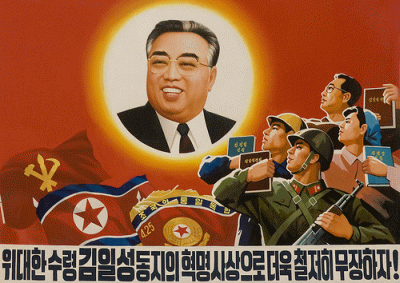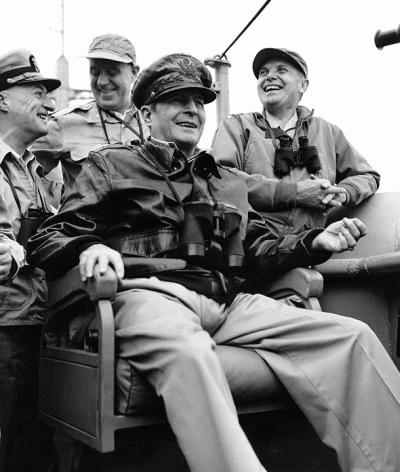
Father
of North Korea's cult of personality. The banner reads: We
must make the revolutionary ideology of Great Leader comrade
Kim
Il-sung our faith, and make his instructions our creed.
Daily North Korea,
South Korea
Another 'Victory
Day' Over the United States
"The
North always promotes the Korean War as 'victorious' primarily because it was Kim
Il-sung who preemptively attacked; so if the North were to concede defeat, the subsequent
failure to spread Communism across the Korean Peninsula would fall directly on
him."
By Yoo Gwan-hee
July 28, 2009
South Korea - Daily North Korea - Original
Article (English)
“With the devotion of the
Chosun People who opposed the American military invaders and Seungman
Rhee's gang of puppets, the war to liberate the Fatherland has
resulted in our victory.” So reads a decree issued by Kim Il-sung dated July 27th,
1953 (Order No. 470 of the Chosun People’s Army’s Supreme Commander).
Subsequently, it was that day,
the day of the signing of the Korean Armistice, that North Korea designated the
“Day of Victory in the Fatherland Liberation War,” or “Victory Day” - one of only ten national holidays.
The North always
promotes the Korean War as 'victorious' primarily because it was Kim Il-sung who
preemptively attacked; so if the North were to concede defeat, the subsequent failure
to spread Communism across the Korean Peninsula would fall directly on him.
On the other hand, the North
could have claimed some kind of victory by claiming to have "successfully
resisted American attack.”
In any case, the central
focus of Victory Day is to praise Kim Il-sung’s achievement,
for which Pyongyang has three methods.
THREE WAYS TO CLAIM VICTORY
The first is to say that the Korean War succeeded in safeguarding at least part of the
Fatherland from an attack that was instigated by, “American imperialists and the
gang of South Korean puppets.” Therefore, the North fought a victorious war.

General
Douglas MacArthur oversees the invasion of Inchon
in
1950. The invasion of Inchon was the first allied victory after a
string of defeats at the hands of the Korea People's Army. The
war ground on for three more years until ending in a stalemate.
According to Volume 12 of The
Complete Works of Kim Il-sung, which has greater legal and moral influence than
the Constitution, the Korean War is recorded as a war in which the North was
invaded.
During an emergency cabinet
meeting after war broke out in 1950, Kim Il-sung gave a speech entitled, With
Decisive Defense, Let Us Drive out the Military
Invaders, which contains strong criticism of the “South Korean attack.”
The address includes the
following statement: “Seungman Rhee's traitorous gang of rebel puppets have initiated an unprovoked
military invasion, opposing the North across the 38th parallel … under direct
American control, the puppets have long been preparing to infiltrate the North …
The Republic government [Pyongyang] has made its best efforts to achieve the peaceful
reunification of the Fatherland and prevent such dog-eat-dog fighting ... Our
People's Army must clear out the infiltrators, immediately frustrate the enemy invasion
and mount a decisive defense ..."
SECOND METHOD
The second piece of logic is
to suggest that even though North Korea was a new country established less than
a year before the war, in order to defend itself it battled enemy powers that
were far superior in number. Therefore - it was a "victorious battle."
Posted
by WORLDMEETS.US
North Korea maintains that
South Korea, after suffering as a subjugated Japanese colony for 36 years, enjoyed
"happiness" under Kim Il-sung's leadership
for five years after liberation [1945-1950]; that South Koreans came to recognize the value
of the Fatherland; that Kim's leadership helped South Korea gain its
independence after the immortal struggle against Japan; and finally, that the
North has been able to fight off and achieve dominance over American and South
Korean forces.
[Editor's Note: On August 15, 1945, Korea was liberated from Japanese occupation. In the South, August 15 is a national holiday called Victory Over Japan Day. In North Korea, it is celebrated as Fatherland Liberation Day. Korea did not in fact gain independence on August 15, 1945, but was occupied by Soviet and U.S. armies. The northern half of the peninsula was occupied by the Red Army (Russia), and the southern half was occupied by the United States.
Five years later, the Korean War broke out when the North invaded. The war essentially boiled down to competing attempts to achieve Korean unification. Led by the United States, the U.N. entered the war on the side of South Korea's Seungman Rhee government, and eventually, the People's Republic of China came to the aid of the North and Kim Il-sung.]
THIRD METHOD
Lastly, North Korea maintains
that thanks to the war, Pyongyang was able to humiliate the United States, a
great power that takes pride in its long history of victory in war. From North
Korea's point of view, inflicting this humiliation alone is worthy of the word
"victory."
At the time, it had only been
three years since the founding of the People’s Army. But Kim Il-sung's unsurpassed leadership and strategic maneuvers, which
helped overcome Japanese imperialism and unify troops and civilians in devotion
to himself, defeated the combined force of 16 countries under the U.N. flag.
Posted
by WORLDMEETS.US
Specifically, North Korean
authorities boast that the United States, which placed such misplaced
confidence in its numerical and material superiority, eventually came to heel holding
a white flag and signed the Armistice Agreement.
However, in South Korea, the war
is described as "a tragedy of fratricide." After the U.N. entered the
war, the South was able to drive back the North's invasion. But the war is seen
as a "tragedy" for the Korean people - which must never be permitted
to happen again.
But up North, the regime
simply makes it out to seem that South Korea is frustrated by the North’s
victory, and commemorates the day in the name of the achievements of Kim Il-sung.
[Posted
by WORLDMEETS.US August 1, 7:25pm]